Dispatches from Aspen
Four student Scholars reflect on their experience in Aspen.
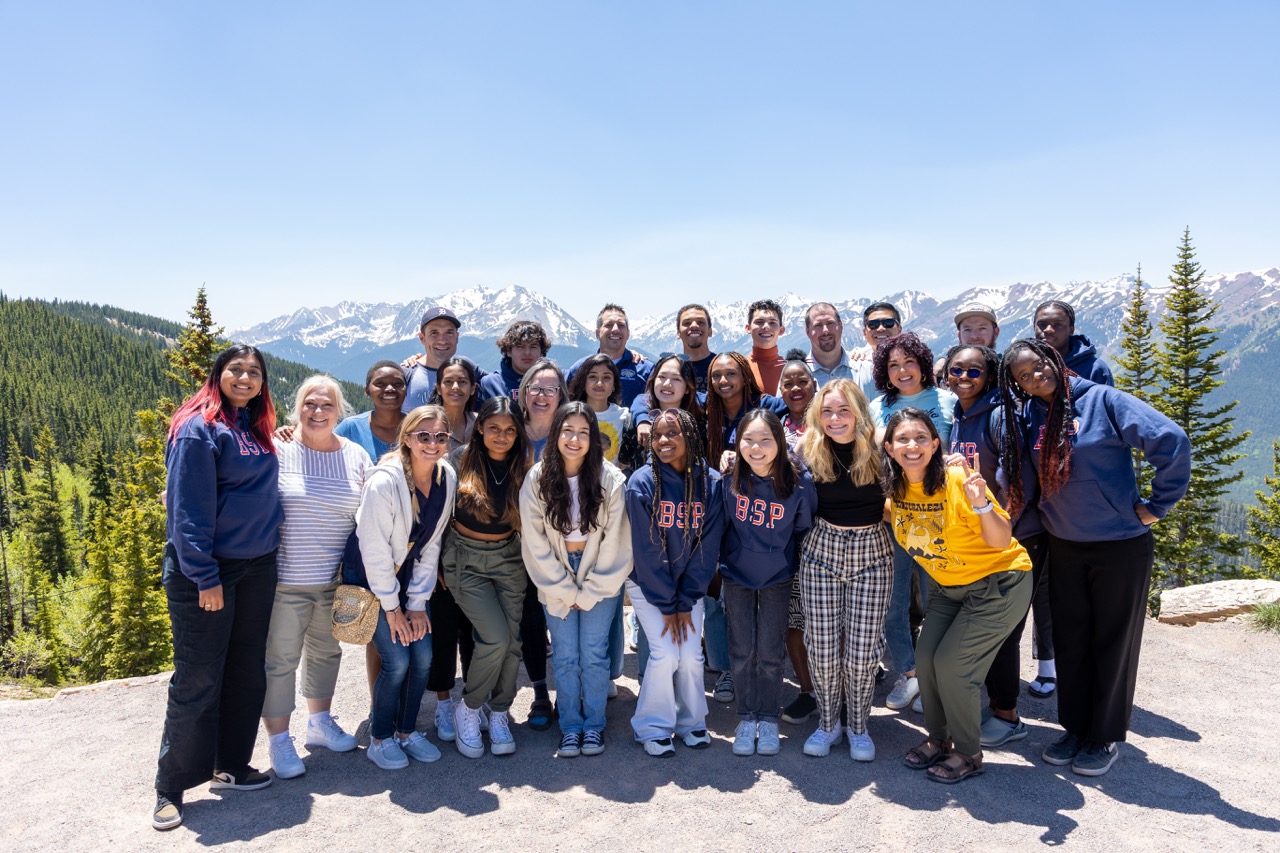
Last month, the 2023 Scholar cohort gathered in Aspen for seven days of connecting, learning, and growth. Scholars joined world leaders and changemakers at the Aspen Ideas Festival where they asked big questions and dreamed up bigger ideas.
We invited Scholars to reflect on their time in Aspen and share their experience.
Amanda Liu
Student Scholar • Fullerton, California
The Bezos Scholars Aspen Trip was an experience I will never forget. Upon my arrival, I was greeted with a crisp and refreshing breeze, the smiling faces of my fellow scholars, and the prospect of an unforgettable week. From my first 6 am morning hike to an unintentional run-in with the Dean of Juilliard, this experience was nothing short of an adventure. The highlight of the trip (besides the delicious food!) was the opportunity to attend the Aspen Ideas Festival where Scholars selected informative sessions, contributed to meaningful discussions, and interacted with insightful speakers. From this experience, I took away one key lesson: the importance of embracing my authentic self while understanding the perspectives of others.
One of my favorite sessions was the, How to Engage in Conversations on Race discussion. The five panelists – Reggie LaGrand, Monica Haslip, Rabbi Jonah Pesner, and Ska-xjeing-ga Vicky Stott – emphasized the importance of fostering sensitive conversations surrounding race to make everyone feel seen, heard, and respected for their backgrounds. By sharing our stories and deepening our connections, we can find common ground to transform and improve society together.
This tied in with another session, “Read with Jenna: Migration and the Meaning of Home,” featuring New York Times Best Selling Chinese-American author, Jamie Ford, and Salvadoran poet, Javier Zamora. Both writers used literature as a form of expression and incorporated the immigrant journey into their narratives. As a first-generation Chinese-American, it was empowering to hear their personal experiences with migration, dual identities, and the impact of intergenerational trauma on mental health. After the event, I deeply connected with Jamie Ford on our understanding of Chinese culture and how it affects our view of the world. These sessions taught me that by grounding ourselves in our individual experiences of oppression and opening ourselves to others through vulnerability, we have the power to create cultural unity, healing, and equity in our communities.
During the Scholar-only notable sessions, I co-hosted a fireside chat with Mónica Guzmán, a senior fellow at Braver Angels. Mónica struck me as one of the most open and compassionate people I’ve ever met. Her experience of having different political views with her parents and others, which often resulted in heated arguments at the dinner table, resonated with me. However, instead of viewing diversity as a weakness, Mónica taught us to view it as a strength. She stated that, “we’re so divided that we’re blinded,” and reminded us hat we must step out of our comfort zones and open our eyes to the perspectives of others before making judgments.
Looking forward, I hope to carry on this empathy and open-mindedness when implementing my community change project. I am eternally grateful to the Bezos Scholars Program for this amazing opportunity!
Brendan Salisbury
Student Scholar • Desert Hills, Arizona
We were always told as kids not to talk to strangers. However, when you arrive at the Aspen Ideas Festival, the first thing you are told is that you will only thoroughly enjoy the event if you engage in educated debate with new people and beg to differ with some of the greatest minds in the world.
Luckily, being raised as an Italian American, talking with others has never been an issue for me. But stopping is a different story. The Aspen Ideas Festival is one of the most incredible events I’ve ever attended, with an unmatched richness of intellect, culture and perspective. However, amid this cacophony of brilliance, one theme stuck out in almost every seminar, notable session, and meal I participated in: empathetic listening.
One of my dear friends and current Bezos Scholar, Breanna Wollman, put it best when she said, “Listen to understand, not to respond.” Empathetic listening emerged into conversations when two people in the room began to disagree. One could immediately see the quality of conversation/debate they would have based on the respect they gave one another in their first few remarks.
A specific instance of this empathetic listening that genuinely inspired me was from Candice Dodgers, a leading researcher at Duke University, in the late-night debate over whether social media was ‘bad’ for kids’ mental health. She argued no. However, she nuanced her view by approaching the claim from a myriad of perspectives that were part of her: a survivor, a friend and a researcher. She explained that as a highly trained researcher, one must look for direct causative links that effectively establish a claim or, at the very least, reject a null hypothesis. She stated that no study has provided a direct causal link yet.
What she said next changed the whole landscape of the debate. Dodgers shared that she struggled with how her own side of the argument seemed to invalidate others. She described how she’d seen group after group of children struggle with mental health issues in her studies, and she wanted to get to the bottom of it as an advocate for children and a developmental psychologist.
That’s why much of her current research is focused on finding the link between the impact of social media and children’s mental health. She emphasized the duality of truth and belief, which I now understand are crucial to understanding another person’s argument, as their truth might differ from ours.
As I move on from Aspen and into my Local Ideas Festival, I look forward to practicing this skill of empathetic listening so that I’m able to provide my community with what they need in contrast to what I want to see realized. Prioritizing the understanding and serving of others is one of the most influential lessons I learned in Aspen, and I will continue to develop the skill as I move forward. I want to express an incredible amount of gratitude to the entire Bezos Scholars Program team for making this experience possible, as well as the caterers, speakers and every mind that could impart wisdom onto mine. Thank you.
Meet the Notables
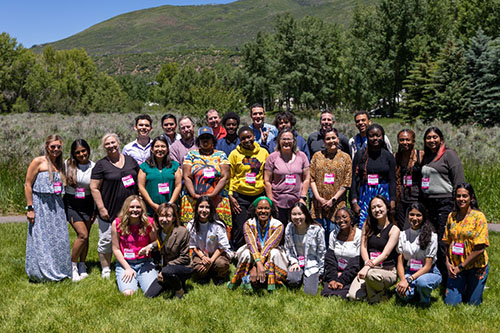
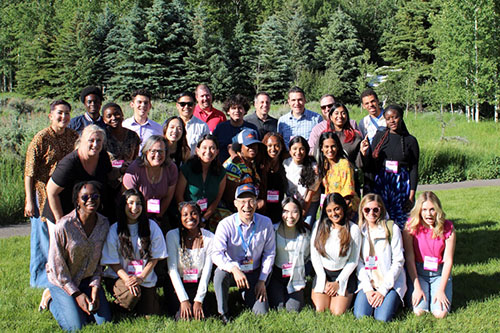
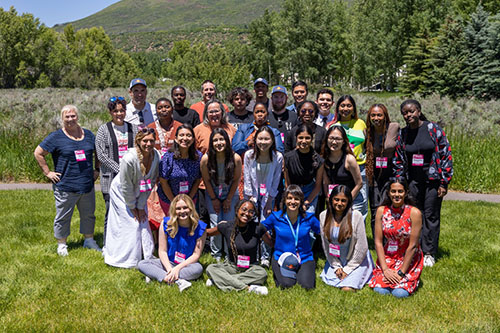
While in Aspen, we invite notable speakers and leaders to participate in a Scholars-only conversation. This year's notables included (in group shots from left to right) Imani Perry, Eric Liu, and Mónica Guzmán.
Dyuthi Aryasomayajula
Student Scholar • Ann Arbor, Michigan
In the paraphrased words of Eric Liu of Citizen University, being an immigrant is not only a political matter but also one of relativity: when thrown into a new environment, while unfamiliar with a culture’s customs and behaviors, they are an immigrant. I was an immigrant at the Aspen Ideas Festival, where world leaders unite and share their expertise and perspective with curious individuals. Reflecting on this experience feels like a pleasurable fever dream: fascinating, fast, and fun.
Despite how incredible this event was, I was still challenged by my immigrancy. Being one of the youngest attendees, I needed guidance on a fair amount of vocabulary used in some panels and how to properly converse with these speakers, conversationally and behaviorally. Was sitting on a couch hugging a pillow while discussing world issues over tacos too casual? Many attendees I shared meals with didn’t seem to think so, and now we’re talking, but what’s too simple and too formal: where was the sweet spot?
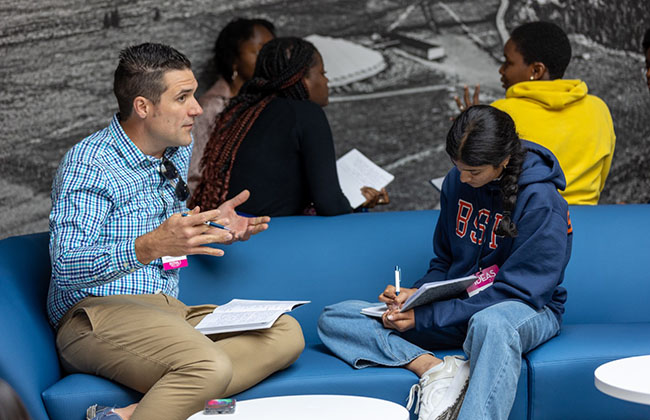
My Educator (Dan Giddings, left) and I (Dyuthi Aryasomayajula, right) are discussing how to solve local communal issues while sharing our perspectives and stories as to what we've experienced regarding said issue
This puzzlement was not only my own, but one of every attendee: we all came from unique backgrounds where we used a different vocabulary subset, seasoned with professional terminology and cultural expressions. So, how would attendees convey ideas when each individual speaks a foreign ‘language’?
Storytelling.
Imani Perry and Natasha Carrizosa both illuminated the importance of conversations centered on shared experiences. What struck me about Perry was that she answered every question with a story, and Carrizosa made us feel through her poems and narratives.
After understanding the power of storytelling, I brought my ‘immigrant’ narrative to the forefront of my personality. I even used my “Gen-Z” vocabulary to convey an idea, and its meaning came across perfectly when framed in the context of a story.
Using my own stories helped me ask bold and critical questions in each session and connect with some of my biggest inspirations along with attendees. Additionally, my narrative helped me put myself out there and helped me understand the person I was conversing with. Others’ histories help us better understand their motive, perspectives, and personalities.
I left Aspen understanding the power of storytelling: how it can unite people from starkly different backgrounds. By contextualizing others’ experiences, you broaden your worldview and become a more self-aware individual, hence a better citizen. In a pool full of Aspen Ideas Festival immigrants who all spoke different languages and had different backgrounds, each of us brought our ‘immigrant’ narrative to the table, I’m thrilled to bring back this powerful medium to my community, and to be a changemaker through stories.
Jessie Jingqi Lin
Student Scholar • Rancho Cucamonga, California
I sit amidst thousands in the Benedict Music Tent. Rustling cottonwood envelopes the amphitheater, intruding on my racing internal dialogue. My mind slows as the rhythmic drums that reign the chambers beneath my chest grow individually distinct, booming in resonance. I rest against the bright blue bench as a peculiar nostalgia surfaces.
It suddenly emerges with existential weight that in hours, I will leave this ethereal place, where evergreen grass bent to the will of a soft breeze will rest beneath my tennis shoes, the speakers’ wisdom preserved in subconscious echoes. Soon my view will be constrained to a small hazy window overlooking miles of the verdant Aspen, where only my unwilling goodbyes will be left behind.
I will return to the busy streets, the packed suburbs, the warm familial embrace, the routine comfort of Cantonese cuisine on my tongue. Yet this week will engrave in my memory, like a familiar melody that harmonizes upon each mental replay.
For a week sitting in the front row, I was captivated by global leaders animated in blazing passion with discussion on the communities they impact. This is a world unknown to me, where “work” is not a demon gnawing away at rest and livelihood, but a seed with unlimited purpose for excitement and potential.
This is a world where Mónica Guzmán of Braver Angels challenges me to unreservedly question my implicit truths, to see my reality from an objective lens, and to first understand rather than defend. It is where Shauna Carey of Ideo.org urges me to centralize advocacy on the individuals I serve, to cultivate human-centered designs, and to use valuable community assets. It is also where Eric Liu of Citizen University invites me to welcome critical feedback, to cherish human relationships, and to lead through engagement.
Most extraordinarily, this is a world where I work alongside young trailblazers of my generation, whose compassion and dedication exceed their conscious beings, shape their internalized identities, and energize every shift of their verbal intonation. They drive me to work for the community vision I see, not simply wish it.
The Bezos Scholars are my oasis. Together, we brave our vulnerabilities rather than cower, we confront flawed values rather than endure. Without a single syllable uttered in affirming our bonds, we were already a family. I will never be able to fully express the extent of my gratitude for having a space where lifelong intellectual curiosity is the norm.
It is strange to already miss this place despite being here. It is stranger to already wish for a reunion with people who sit beside me.
But for now, I will hungrily grasp at every word exchanged and memory made, capturing each into a cognitive capsule, and aspire for a day I can return once again to the rustling cottonwood.